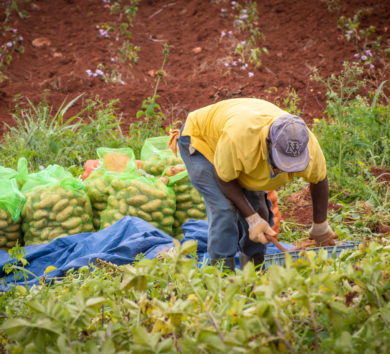

Minister of Agriculture, Fisheries and Mining Floyd Green says poultry is among the world’s most valuable sectors, with global consumption set to rise 3 per cent in 2025 due to its sustainability and affordability.
Green revealed that in the context of Jamaica, there are over 75,000 registered broiler farmers. Most of whom are women and youth, according to the Rural Agriculture Development Authority (RADA) database. “But to be honest, that just tells part of our story because, to jobs, our poultry sector employs over 392,000 persons here in Jamaica. It contributes about 8 per cent to our agricultural and manufacturing GDP numbers, and over the last 10 years, we have seen a 40 per cent growth in our production numbers,” he said.
In 2023, Jamaica produced 137 million kilograms of poultry, and the minister revealed that his team will continue to ensure that the policies align with growing the sector.
Green also highlighted the recently launched Project FEED initiative, which is feeding the economy through empowerment and development to help develop and support women and youth farmers in poultry.
“This is because we have seen how poultry enables our women and our youth to create sustainable and predictable outcomes, such as a fixed daily output with eggs and investment returns in six weeks for our broiler production,” he added.
Green noted that the poultry sector is also projected to have a market value of US $400 billion by 2032. “This again can be attributed to the fact that, as we all know, poultry remains very affordable and accessible, and for Jamaica, it is the most affordable and accessible animal protein and accounts for over 41 per cent of the animal protein consumed by Jamaicans, with chicken being the most widely consumed meat in Jamaica.
“Fortunately, we’re about 90 per cent self-sufficient in poultry production, and in relation to eggs, we are over 100 per cent self-sufficient in eggs, save and except when we have our weather challenges, but the good news is that looking at the figures, the rebound is happening in a real way,” Green continued.
The minister also stated that Jamaica is seeing growing investment in value-added, ready-to-cook meats, processed nuggets and expansion in the domestic market offerings. However, the sector is not without challenges. “Climate change continues to impact agriculture as a whole, and I must pause to commend our poultry farmers, not just for their resilience but also for their action in employing and embracing climate-smart practices. Most of our poultry farmers now, big or small, are embracing rainwater harvesting, energy-efficient housing and heat stress management.”
Additionally, Green noted that the sector is increasingly adopting automated feeding systems, temperature-controlled housing and digital monitoring tools, making it not only climate resilient but also one of the most technologically advanced livestock subsectors.
Challenges to the poultry sector
He further revealed that one of the sector’s most significant challenges is the threat of highly pathogenic avian influenza, commonly called bird flu, a deadly virus found in poultry, other animals and humans.
“It is present in several regions of the world, including the Americas. It moves across borders silently, often carried by migratory birds, and can be introduced through contaminated feed, equipment, clothing or improperly declared imports,” he said.
Green noted that once this virus is inside a country, it spreads rapidly, causing high mortality, economic devastation for farmers and trade restrictions. “Ultimately, to put this into perspective, we have established that poultry is not only the largest source of animal protein for the Jamaican people, but it also supports the livelihood of thousands of people. Our small backyard growers account for 40 per cent of our total production, and then we have large-scale producers, feed suppliers, and distributors. Therefore, a single case of bird flu would threaten it all.”
In response to this issue, he said the Ministry of Agriculture, Fisheries and Mining, through its Veterinary Services Division, is taking a prevention-is-better-than-a-cure approach. “As such, our national approach can be summed up in one word: exclusion. This means that our main focus is to prevent the virus from entering Jamaica in the first place. This approach of prevention is more cost-effective, humane and far more sustainable than trying to contain an outbreak after the fact,” Green added.
To achieve this, he said the ministry is reinforcing a multi-layer strategy that the entire region can focus on. This includes:
- Enhanced border protection, strengthening veterinary surveillance at ports of entry and increasing screening of high-risk imports, including poached products, live birds and feed materials, and engaging Customs and Border Security personnel in specialised training around this fact.
- Two, wild bird monitoring, as Jamaica is along a migratory path of several bird species, and as such, the Veterinary Services Division, in collaboration with international partners, are conducting ongoing surveillance of wild bird populations, particularly in wetland and coastal areas.
- Three, robust on-farm biosecurity by working closely with poach producers, large and small, to ensure strict biosecurity practices. This includes controlled farm access, disinfection procedures, proper disposal of waste and dead birds and regular health monitoring.
- Public awareness and education to emphasise the role of public vigilance while ramping up public education aimed at farmers, backyard growers, vendors and pet bird owners, ensuring that everyone understands the risk and warning signs.
- Finally, emergency preparedness and response. In the unlikely event that bird flu is detected, everyone must be ready, and there must be contingency plans, including rapid response teams, quarantine protocols and disease containment strategies, which are being regularly updated at the ministry.
However, Green stated that the only way to successfully achieve this is through partnership. “That’s why we’re happy that the Caribbean Poultry Association (CPA) is back in Jamaica this year. This will take each stakeholder, farmer, industrial leader, veterinary professional, exporter, and consumer taking personal responsibility in this regional effort. We all must report suspicious illnesses, follow biosecurity guidelines and be alert and proactive,” Green concluded.






Comments